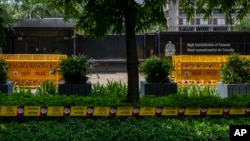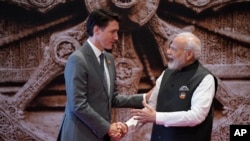An unprecedented allegation by one leading democracy essentially accusing another of carrying out a political assassination on its soil is causing significant concern among key allies of both nations.
Officials in Washington and London are assessing the ramifications after Canada publicly tied India’s government to the killing of a Sikh leader three months ago. Canada on Monday announced that in response, it had expelled the top Indian intelligence official in Canada. India on Tuesday retaliated by ordering a senior Canadian diplomat to depart the country.
“We are deeply concerned about the allegations referenced by Prime Minister [Justin] Trudeau,” said Adrienne Watson, spokesperson for the White House National Security Council. “We remain in regular contact with our Canadian partners. It is critical that Canada’s investigation proceed, and the perpetrators be brought to justice.”
The United States is urging India to cooperate with the Canadian investigation, according to a senior State Department official.
India’s government says any allegations of involvement by its officials in acts of violence in Canada are “absurd and motivated.”
"The government of India needs to take this matter with the utmost seriousness. We are doing that, we are not looking to provoke or escalate," Trudeau told reporters on Tuesday.
The allegations, however, “have the potential to cloud out other strategic challenges Canada faces, such as foreign interference by China and Russia. The timing comes less than one year after Canada's release of an Indo-Pacific strategy which highlighted the aspirations for greater partnership with India,” noted Jonathan Berkshire Miller, director of foreign affairs, national security and defense at Canada’s Macdonald-Laurier Institute.
Canadian officials have not revealed what evidence they have linking India to the murder of Hardeep Singh Nijjar, a Canadian citizen.
“I fear that this incident, regardless of the veracity of Ottawa's accusation, will have a generational impact on Canada's relations with India. The damage has been done with the very public loss of face for Delhi,” Miller told VOA. “On the other hand, if this is credible and definitive evidence points to Delhi's direct involvement, it is an egregious act that needs to be called out and reprimanded. There are still many questions about how closely India is linked to this.”
A Canadian source is quoted by Reuters saying, "we've been working with the U.S. very closely, including on the public disclosure yesterday,” adding that Canadian evidence implicating India would be revealed "in due course.”
When contacted by VOA, the Federal Bureau of Investigation declined comment.
British officials say they are in touch with their Canadian counterparts about the matter.
“It would be inappropriate to comment further during the ongoing investigation by the Canadian authorities,” said a government official in London.
India has repeatedly accused Canada of harboring “Khalistani terrorists and extremists” who are considered a threat to Indian national security.
Canadian officials have now canceled an economic mission to Mumbai next month. Officials in Ottawa and New Delhi acknowledged on Tuesday that Canadian-Indian trade talks are on hold.
Nijjar was shot dead by two masked gunmen on June 18 in a Vancouver suburb outside a Sikh temple, of which he was the president. Police said it was a targeted killing and have sought a third suspect who they say helped the assassins flee.
The 45-year-old native of Punjab state in India ran a plumbing business in the Canadian province of British Columbia. Indian officials had branded him a terrorist and charged him in connection with targeted killings in his native state.
Canadian officials say Nijjar had never been accused of any crimes in Canada and had peacefully advocated for a referendum in Punjab to establish an independent state of Khalistan.
Sikh separatist groups, for decades, pursued such autonomy. The Indian government labeled such activities as terrorism. It has been an especially sensitive matter for years in Canadian-Indian relations, as Canada is home to the largest number of Sikhs outside India's Punjab region.
In 1985, Air India Flight 182 exploded off the coast of Ireland after departing Canada for India via London. All 329 passengers and crew members on board died. Authorities concluded it was a terrorist act carried out by a pro-Khalistan group. One suspect was convicted in 2003.
The targeting of the civilian aircraft followed a period of violence in India. Khalistani militants violently took over the Sikh religion’s holiest site in 1984. Prime Minister Indira Gandhi ordered military commandos to respond, which left hundreds of militants and pilgrims dead. The prime minister was subsequently assassinated by two of her Sikh bodyguards. That sparked widespread violence in which thousands of Sikhs were killed. India’s ruling Congress Party was seen as complicit in the killings.
There are 55 interlinked Kashmiri and Khalistani groups currently operating within the United States, according to a 2021 report by the Hudson Institute.
“Sikhs always feel hurt” because of that history, Jesse Singh, the founder and chairman of Sikhs of America, said on Tuesday during a Hudson panel discussion on terrorism and other regional security challenges.
Singh added that the Khalistan movement is not a significant among Sikhs in North America these days, but the issue does retain more resonance among the diaspora compared to those in India who have moved on.
Sikhs compose the world’s fifth-largest religion and nearly 2% of the population of Hindu-majority India with most of India’s Sikhs living in Punjab where their religion is the dominant faith.
Indian Prime Minister Narendra Modi has “to do more to win the Sikh psyche back,” according to Singh.
Sikhs have long had an outsized role in India’s military and as athletes and entrepreneurs. They were also prominent in India’s independence struggle against the British.
Chief National Correspondent Steve Herman was VOA’s South Asia bureau chief, based in New Delhi, in 2007-2010. VOA’s National Security Correspondent Jeff Seldin contributed to this report.






